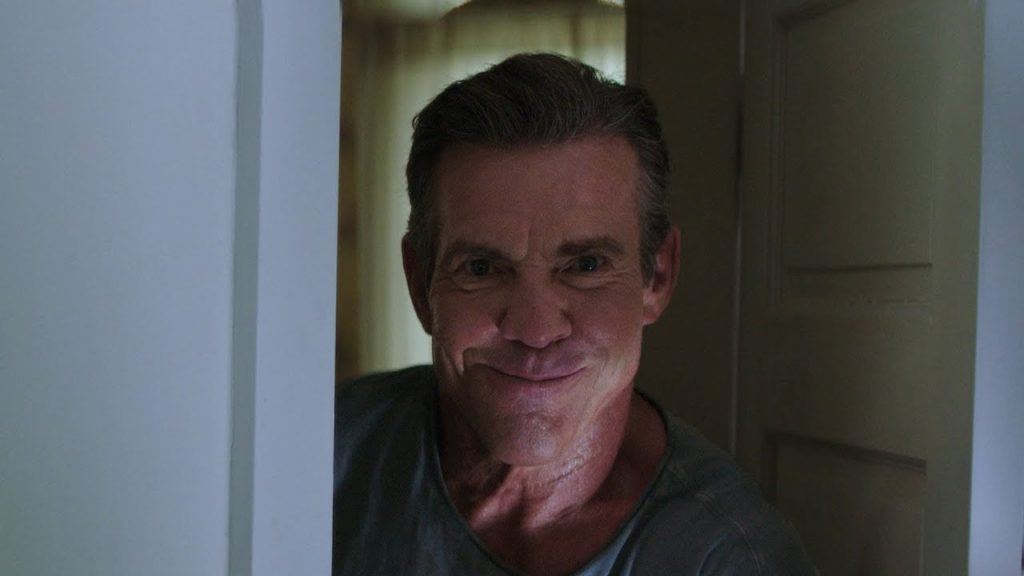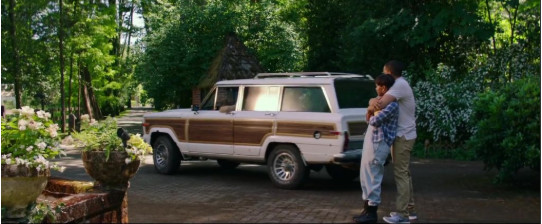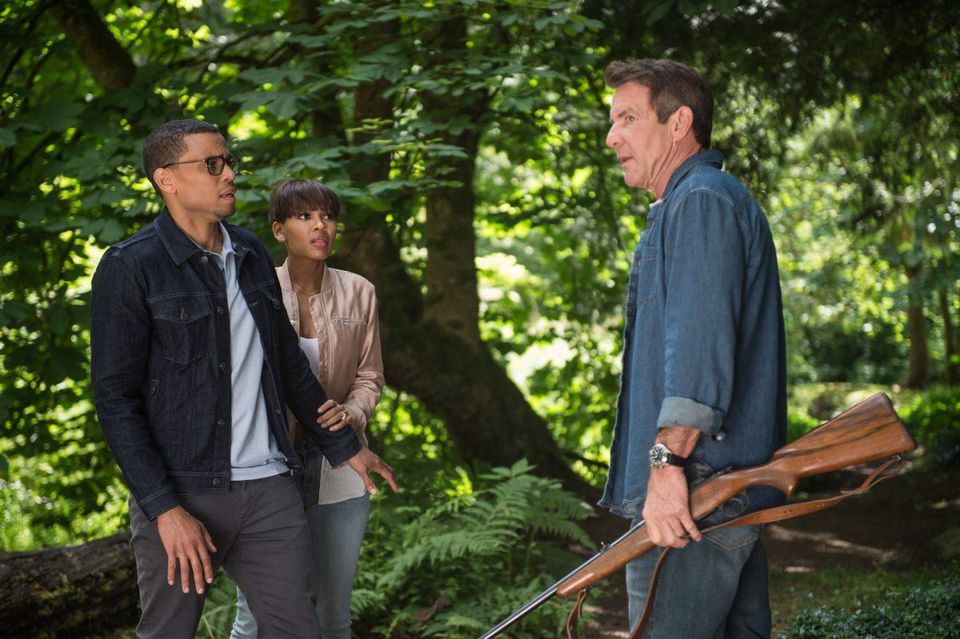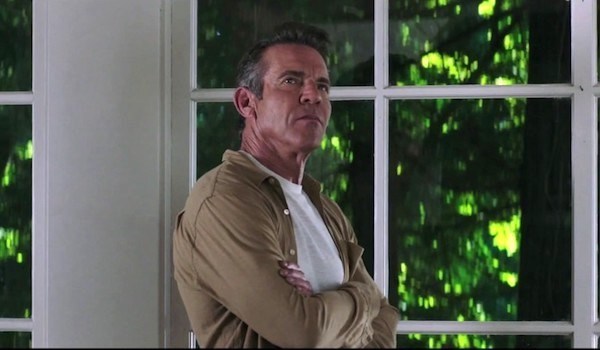Deon Taylor has an uncanny knack for lulling one into a false sense of security when it comes to both his characters and his audience. He shows us ordinary people who become victims to terrifying circumstances, but who somehow find the inner mettle to survive. He also excels at showcasing the power of family, love, and that inherent will to survive, relying on the first two to propel the third. We saw it in “Supremacy”. We saw it in “Traffik”. We even saw it in the dark comedy “Meet the Blacks.” His films boast dark forces and faces that we often don’t see or knowingly look away from. And now Deon Taylor gives us THE INTRUDER. He once again brings terror to our home and our hearts and lays it on our doorstep, literally and figuratively, immersing us in true moments of jump out of your skin, heart pounding fright. You think you were afraid of monsters in the closet and under the bed before? Just wait until you see THE INTRUDER. In true Hitchcockian style, the monsters here are more frightening than ever thanks to an award-worthy, insanely brilliant performance from Dennis Quaid.

Every film starts with the words on the page and THE INTRUDER is no different. Scribe David Loughery has long been a favorite thanks to films like “Passenger 57″ and “The Three Musketeers.” He knows character. He knows how to meld characters and play them against each other to further an emotion or tone within the story. And he does that exceedingly well with THE INTRUDER thanks to the triptych character structure of Annie, Scott, and Charlie Peck.

Annie and Scott are your average couple living the dream; a very financially secure and well-off dream. Scott works and lives to please Annie. And what Annie wants is a house and kids, to get out of the city and complete her dream. That dream includes Foxglove; a beautiful six-generation estate with exquisitely manicured lawns, wooded grounds, a stream, and at the center of it all, a stone house that is breathtakingly impressive and imposing. And where there’s Foxglove, there’s owner Charlie Peck. Charlie is selling his beloved home to start fresh in Miami with his daughter, and to put distance between himself and his memories of his wife dying in the house. Annie takes a liking to Charlie and feels his sorrow. Scott is more cynical. And while Charlie says he wants to leave the past behind, does he really? At every turn, Charlie shows up at the house mowing the lawn, offering up bottles of wine, yelling at contractors installing surveillance cameras. The house is no longer his, but Charlie can’t seem to let go, which plays to Annie’s sentimental side as she feels a somewhat paternal bond with Charlie. Doesn’t take long before Charlie’s invited to Thanksgiving dinner and soon thereafter helping Annie put exterior Christmas lights on the house. Annie sees it all as perhaps a bit sad, but perfectly normal. Scott, on the other hand, becomes more and more suspicious about Charlie.

With a straightforward story set-up, Loughery then lets character take over while giving us some meat and potatoes speaking to issues of mental illness, infidelity and the fact that the doubt and mistrust created by it never truly goes away, couples wanting the dream but can they afford the dream – emotionally and economically, emotional loss, loyalty, gun violence. There’s a lot brewing in the emotional pot that builds character and story but also gives the audience something to latch onto which creates doubts, suspicions, uncertainty and ultimately, fear.
The third act is where Deon Taylor’s directorial talents and visual storytelling structure really shine, not to mention Melissa Kent’s terrific editing which has gone from a slow burn to being exponentially intensified with tension and terror by this time.

Playing to the strengths of the story construct, Deon Taylor and cinematographer Daniel Pearl take the reins to create a compelling visual tonal bandwidth. Pearl is an excellent choice here as cinematographer as he delivers some really beautiful and polished imagery. The visual tonal bandwidth is a beautiful mix of the high polish of some of Pearl’s music videos but then adds its own layer of storytelling through light and shadow reminiscent of what he delivered in “The Boy” and “Pathfinder.” Pearl excels with his framing and creating a sense of Annie and Scott being trapped or cornered by Charlie, something that all the windows in the house belies. It’s a fabulous dichotomous juxtaposition and adds much to the story. Playing to the windowed walls of the back of the house, the windows buttress the “openness” of Annie and Scott’s relationship, while Pearl’s framing and inventive dutching contrasts that whenever Charlie appears. Very intriguing construct that fuels the terror and tension. Night shoots within the house and with power out are chilling as we move into that powerful inky blue-black color palette with the fringes of negative space that make the hairs on the back of your neck stand up!

As comes as no surprise in a Deon Taylor film, exterior night shoots and a chase through dark wooded areas with only a single torch light for the camera, plays a big part in ratcheting up the film’s fear factor. Similarly, a claustrophobic sickly yellowish-green tinged underground tunnel system on the property lensed with handheld and Steadicam, serves to make the audience willing participants in this psychological-turned-physical cat and mouse game. And with visual nods to classics like “Psycho” and “The Shining”, not to mention Taylor’s own “Traffik”, there are plenty of moments for screams aplenty.

The first seven or so minutes of the film are problematic, only to the extent that it feels like we are watching a redux of “Traffik.” Editing cuts during a rooftop party scene are the same as those in “Traffik”, complete with a mid-two shot of Annie and Scott with hard cut to wide shot and back to mid. While this roughness is undoubtedly due to timing concerns, it feels like a disconnect. Having said that, this can bode well for story points to be revealed late in the film, but in the moment, it feels forced and disjointed when Scott looks so adoringly at Annie without the camera holding the shot. Preferable would have been a nice slow zoom which would enhance the emotional resonance of the scene and really give a strong set-up for later plot points. As Taylor also did in “Traffik”, he uses beautiful aerials of the couple driving long, winding and twisted roads as they traverse from the city Foxglove. The metaphor is fabulous for the twists and turns of life. It also serves to set the stage for how far removed from the “world” Annie and Scott are going, almost as if they want to insulate themselves. That once again then aids in escalating the palpable terror that unfolds for them.

Applause, Applause for production designer Andrew Neskoromny. Already an admirer of his work going back to “Slither” and working with James Gunn, to see what he does with THE INTRUDER is exciting. Not only does Neskoromny design the underground tunnels and lairs, but the Foxglove interiors. Creating two distinct worlds – that of Scott and Annie versus that of Charlie Peck – each is as distinctive and defining as they are for each character, yet there is a cohesiveness and common thread that ties the worlds together like an umbilical cord. The variations of the art, decor and furnishings is perfection, all set inside the stunning stone home which was found on a location shoot.
But the real glory of THE INTRUDER is Dennis Quaid. Once Quaid’s Charlie Peck is introduced, the film revs up into fifth gear and doesn’t even pull in for a pit stop. And by the time we get to the third act, IT IS KILLER!! Literally, figuratively, and bearing in mind that Quaid has already played “The Killer” Jerry Lee Lewis before.

Dennis Quaid gives new meaning to the word “maniacal”. He plays a true villain here – something we’ve never seen from him. He brings some of his “killer” performance as Jerry Lee Lewis to the table (particularly certain shots when Charlie is being overly self-righteous and fake) while Taylor’s staging of certain scenes allow him to bring a touch of Jack Nicholson and “The Shining”, with all of it packaged under shades of “The Parent Trap” dad Nick Parker . Quaid just runs with it and wraps it all up with that smile of his. Award-worthy and pure brilliance. This is without a doubt one the best performances of Quaid’s career. This is the type of performance where you need a director who trusts the actor to “go to that place”. I know that Dennis Quaid can “go to that place” and I know Deon Taylor is a director who gives his actors the space they need to “go to that place.” The end result shows that’s exactly what this cinematic marriage allowed to happen and all to the betterment and success of the film. Dennis Quaid is THE reason to see THE INTRUDER. (Side note: And yes, but for going over a balcony railing, Quaid is doing his own stunt work.)

Foil to Dennis Quaid’s Charlie Peck is Michael Ealy as Scott Russell. After Ealy’s somewhat recent turn as a psycho villain in “The Perfect Guy”, to see him now as a truly perfect guy to Meagan Good’s Annie just further endears him as an actor. With proven comedic talent and timing in films like “Think Like A Man” and “About Last Night”, plus the breadth of his dramatic gravitas with performances in “The Good Wife” and “The Following”, not to mention the control he brings to his role in “The Perfect Guy”, Ealy is the perfect choice for Scott. He brings an ease to Scott which turns into edginess, uncertainty, fear, and ultimately confidence. Ealy brings to bear all the characteristics we normally associate with a mother lion protecting her cubs. Watching him with this arc of emotion is glorious.
Then toss in Meagan Good. Knowing each other off-screen and having worked together previously, Good and Ealy feel very natural together as Annie and Scott. They already have an established rapport between them and it is reflected here on screen. You feel the love between Annie and Scott, but Good then delivers a rich and believable almost paternal feeling towards Quaid’s Charlie. Thanks to Good’s performance, she makes Charlie almost a sympathetic, if not empathetic, character.

Completing this reign of terror and fear is Geoff Zanelli’s score. Impactful. Appropriate. Never overpowering.
And dare I say that the final frame of THE INTRUDER is one of my personal favorites from the tens of thousands of films I’ve seen over my lifetime. It will never leave me.
A film “Taylor-made” to be seen with an audience always ready for a good scream and a good scare, THE INTRUDER can “intrude” on me anytime. I’m ready for a sequel!
Directed by Deon Taylor
Written by David Loughery
Cast: Dennis Quaid, Michael Ealy, Meagan Good
by debbie elias, 04/13/2019











